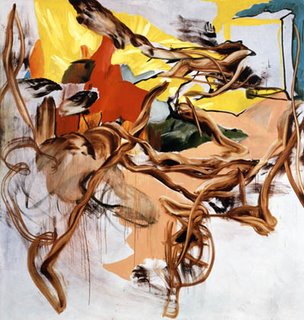Disclaimer: the relationship of this post to that
column of yore is tenuous at best. I am mostly just riffing. Besides, I am sure that Jerry Saltz has gone off to think about more interesting things. I am still, however, thinking about how Saltz wound up invoking the T-word:
In this imperfect realm we experience the undeniable, elemental truth that sometimes, just by making or looking at art, we might discern the full range of human possibilities.The buddhist dilletante in me thinks it's fascinating that Saltz threw out the word truth in the context of talking about this disconnect between one's inside life and one's outside life, seeing as how that's the dharma. There is no actual disconnect, this perception of a disconnect is an ignorance and the cause of all suffering, and the truth, or reality, or enlightenment is nothing more or less than the understanding that there is no existence that is not connected to every other existence.
I am a conflicted and totally unenlightened person. The disconnect between one's inside life and outside life seems crucial to me. It's so interesting, it's the most interesting thing about humans. It seems to me that it's the thing that keeps people, who are physically so weak compared to other top-tier predators, doing amazing things. We have no big teeth or claws, we can't run fast or anything. We have nothing but the fact that we consistently think we can. True, this makes us deny reality all the time, but for every GW Bush there's a David slaying Goliath. There's a Rosa Parks or a Cesar Chavez. There's a Tim Hawkinson or a Yes Man. Why give that up?
I have spent a distressing number of hours with numb legs in dark rooms listening to other people discreetly fart, desperately trying to get enlightened and at the same time wondering if enlightenment is such a good idea. Boddhisatvas have no reason to strive, and there is something I don't trust about that absence of striving. I am so Western that way. I completely believe that the disconnect between inside and outside is an illusion, but I can't stop thinking about what a
useful illusion it is.
My buddhist hero is
Robert AF Thurman, who is unenlightened and I can't help, with typical arrogance, hazard a guess at why. I think it's because he's so delightfully enthusiastic. He's a striver.
But on the other hand, there is something fundamentally interesting about the word
truth in the context of the dharma. It actually starts to make sense, because objectivity stops being such a problematic lie. In other words, the word truth stops being Jerry's Truth or Deb's Truth (the one with the most power gets to be the one with the True Truth). Rather, truth becomes something that stands outside Jerry and me that we both share but neither controls.
What I think is interesting is the way art is about truth and about a lie at the same time. If art was just about truth then going to the dharma talk would be the best art around, but it's not. Art is fundamentally about the disconnect. We want to see our suffering. We think our striving is beautiful. So instead art does this freaky dance. It talks about the lie of our individual selves, and when it's really good it does this in a truthful way. It does attempt to do what Saltz is getting at, it does get at this elemental thing. But the elemental thing seems to be a big lie that we all share.




